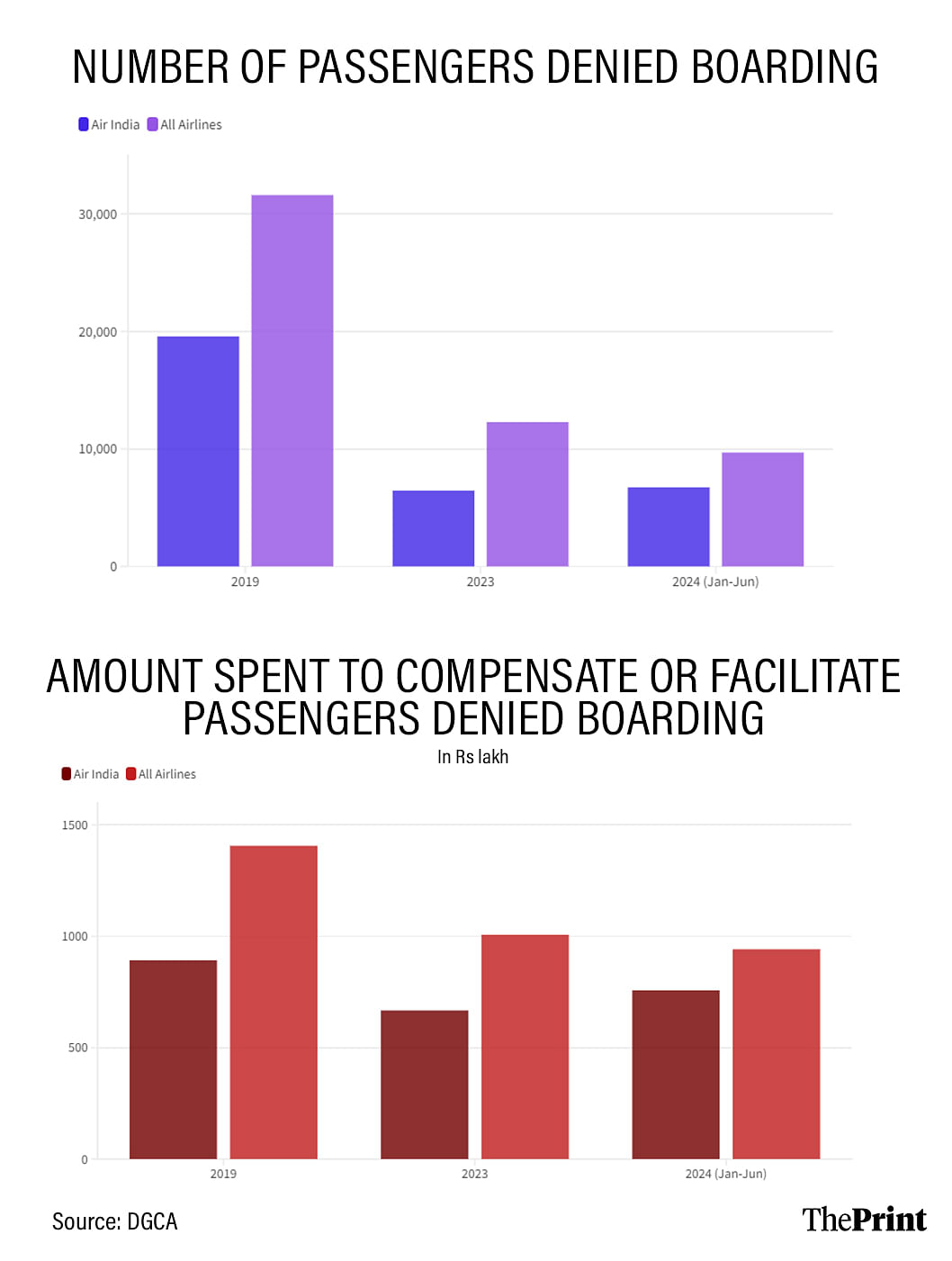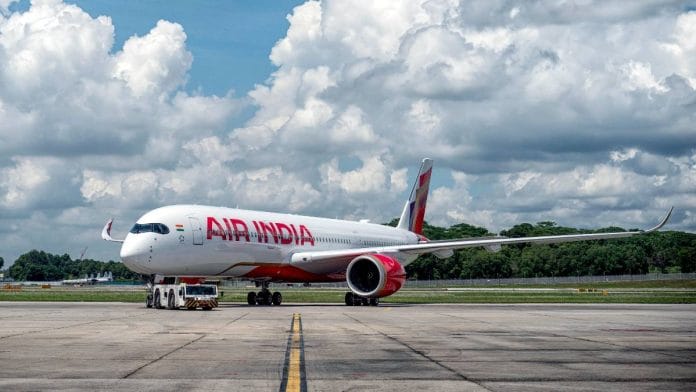New Delhi: In the first six months of 2024, Air India denied boarding to more than 6,700 passengers — accounting for nearly 70 percent of those denied boarding across domestic airlines in India, despite catering to just about 13.5 percent of passengers who flew during this time.
Aviation analysts say airlines deny passengers boarding for three reasons — when the flight has been overbooked, a last minute-change in aircraft, or technical fuel and weight requirements. In a response to ThePrint, Air India referred to the large number of international destinations it serves, unlike other airlines, and how delayed international flights can cause passengers to miss their domestic connecting flights. It also said that it adheres to the limits prescribed for the industry when it comes to overbooking.
According to data from the Directorate General of Civil Aviation (DGCA) analysed by ThePrint, a total of 9,687 passengers were denied boarding by Indian airlines from January to June this year, and of these, 69.5 percent or 6,730 passengers were denied boarding by Air India. The airline spent about Rs 7.5 crore on facilitation and compensation for these passengers in this period.
Air India, which was taken over by the Tata Group in January 2022, is currently the second largest airline in India. It had a 14.6 percent market share in June, when it carried 19.22 lakh passengers.

The data shows that Air India typically accounts for the majority of passengers being denied boarding and that things have not improved much in this regard since privatisation.
In 2023, the airline had denied boarding to about 6,450 passengers, which was more than 50 percent of passengers denied boarding by all domestic airlines that year, according to DGCA data.
In pre-Covid year 2019, when the airline was still run by the government, 19,571 passengers were denied boarding by Air India. This was nearly 62 percent of the passengers denied boarding by all domestic airlines that year.
Data for the years 2020, 2021 and 2022 was not analysed as airline operations were impacted due to the pandemic.
In contrast, Indigo, which is the market leader by a huge margin, which commanded a nearly 61 percent market share this June by carrying 80.30 lakh passengers, accounted for just 4 percent of overall passengers denied boarding in the first six months of this year.
In an emailed response, Air India said: “It is important to put Air India’s data in the right context as the airline, unlike other airlines, serves a large network of international destinations, in addition to the widespread domestic sector. Air India flies 70,000 passengers everyday across the network. This includes over 25,000 international passengers covering over 40 international destinations in 30 countries.”
It added: “The number of cases of denied boarding is very small — only a fraction — compared to the volume of passengers carried. While serving such a wide international sector, the probability of missed connections/denied boarding in the domestic sector may at times happen in the event international flights get delayed due to any operational reason. Air India accords priority to accommodate such passengers who may have missed their onward domestic flight connections in the next available flights.”
“As far as overbookings are concerned, we can confirm that we operate within the limits prescribed for the industry and adhere to and even go beyond the laid down policies of regulatory bodies in such cases for our passengers.”
Also Read: Air India passenger finds blade in meal, airline says it came from machine used by catering partner
Why airlines deny boarding
Nitin Sarin, managing partner at Sarin & Co., a law firm that deals primarily with aviation-related matters, told ThePrint that there are three possible reasons an airline may deny boarding to passengers.
“The first is that the flight was overbooked. It is very routine for airlines to oversell,” he explained. “The second reason could be that the aircraft was changed at the last minute and it had a reduced seating capacity.”
The third reason, he said, could be technical limitations.
“Aircraft performance is influenced by wind and ambient conditions,” he said. “There may be an anticipated change in these factors that may require reducing aircraft load by way of limiting passengers or baggage — this typically happens on long-haul flights, such as India-US.”
Airlines usually oversell — or book more passengers than the actual number of seats available on an aircraft — to account for possible cancellations and no-shows. This is done to ensure that no seat is vacant at the time of departure, averting any economic loss for the airline.
Data shows that during the period under review, Air India spent up to Rs 2 crore per month for the facilitation and compensation of passengers denied boarding.
Security concerns play a part too
Shantanu Gangakhedkar, senior consultant, aerospace and defence, at consulting firm Frost & Sullivan, said that airlines may also deny a passenger boarding over security concerns.
That is, a passenger can be denied boarding if the cabin crew or security personnel spot suspicious behaviour, or if the person has been flagged for a specific reason, issues with ticket/documentation, unruly behaviour, posing a threat to the cabin crew, to other passengers or to themselves, health concerns and baggage issues.
“Each airline has a specific set of policies and the way they are implemented, which may affect the number of passengers denied boarding,” he said. “The routes flown, the complexity of it and passenger demand are some of the factors that may impact the higher or lower possibilities of passengers denied boarding by an airline.”
What compensation passengers are entitled to
According to the CAR (Civil Aviation Requirements), which include requirements for minimum airworthiness, operational requirements as well as passenger facilitation, being denied boarding means an airline’s refusal to carry a passenger or passengers holding a confirmed ticket on a flight even though they have presented themselves for boarding within the time specified by the airline.
However, this excludes reasonable grounds to refuse carriage, such as reasons of health, safety or security, or inadequate travel documentation.
The CAR require that in the case of overbooking, an airline must first ask for volunteers to give up their seats so as to make seats available for other booked passengers to travel on the flight. In exchange, the airline can offer benefits or facilities that it may wish to.
In case an alternate flight, scheduled to depart within 24 hours of the original booked flight, is arranged for the passenger who has been denied boarding, the airline is liable to compensate the passenger with an amount equalling 200 percent of the booked one-way basic fare plus airline fuel charge, subject to a maximum of Rs 10,000.
In case the airline arranges an alternative flight that is scheduled to depart more than 24 hours after the original booked flight, the airline is liable to pay an amount equalling 400 percent of the booked one-way basic fare plus airline fuel charge, subject to a maximum of Rs 20,000.
Additionally, if a passenger does not opt for an alternate flight, they are entitled to a refund of the full value of the ticket and compensation equalling to 400 percent of the booked one-way basic fare plus airline fuel charge, subject to a maximum of Rs 20,000.
(Edited by Nida Fatima Siddiqui)
Also Read: How a new deal with Air India could make Bengaluru airport a South India hub






